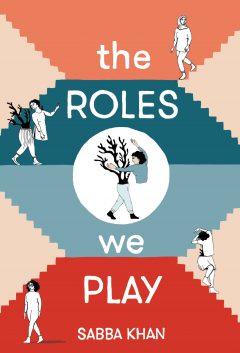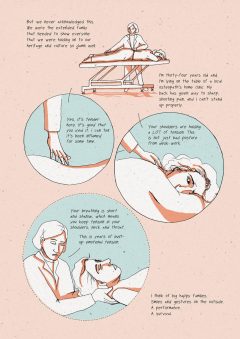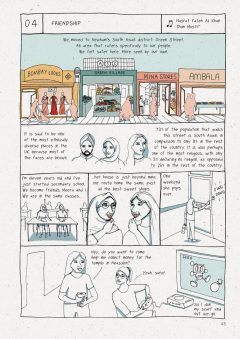Review: The Roles We Play (Myriad Editions)
In her debut graphic novel, The Roles We Play, Sabba Khan presents a look into the day-to-day life of a second-generation Muslim born in the UK. This touching memoir explores what identity, belonging and memory mean for her and her family against the backdrop of this history.
 Publisher: Myriad Editions
Publisher: Myriad Editions
Writer: Sabba Khan
Artist: Sabba Khan
Price: £18.99 from Amazon
Where is home? Two-thirds of today’s British Pakistani diaspora trace their origins back to Mirpur in Azad Kashmir, a district that is now controlled by Pakistan. A second generation immigrant, born in London, Sabba Khan’s debut graphic memoir from Myriad Editions explores what identity, belonging and memory mean for her and her family. She paints a vivid snapshot of contemporary British Asian life and investigates the complex shifts experienced by different generations within migrant communities.
In the prologue to the book, an adult Sabba depicts, mainly through drawings, how she has been affected by other people’s influence throughout her life. She shares her worries about talking about her experience and identity crisis, and what people will say about her book. She explains that this book is for her, and that she refuses to feel totally suffocated, like she is constantly shapeshifting, trying to fit in to different roles and be a mould of what people want her to be. Sabba begins to see the reflection of the people influencing her when she looks in the mirror and begins to hear their negative opinions. Proving she has finally found her own identity, Sabba smashes the mirror. This is where our story retrospectively begins.
 When her ancestral home of Mirpur in (what is now) Pakistan is submerged by water in the 1960s, Sabba’s parents make the move to the UK. As both are the oldest siblings in their respective families, this move is important: it indicates them leading the rest of their family to a new way of life. There is a lot of pressure riding on this being a success.
When her ancestral home of Mirpur in (what is now) Pakistan is submerged by water in the 1960s, Sabba’s parents make the move to the UK. As both are the oldest siblings in their respective families, this move is important: it indicates them leading the rest of their family to a new way of life. There is a lot of pressure riding on this being a success.
The Roles We Play takes us through Sabba’s life from childhood to the present day, though not in chronological order. We get fragments and memories of different parts of Sabba’s life, which eventually form a whole narrative. Born in London, Sabba goes through many personal struggles, a lot due to the ignorance of other British people about their Asian Muslim fellow citizens, and some to do with the male gaze, who see women wearing hijabs as un-feminine and genderless (we think the hijab is beautiful). As she grows older, Sabba begins to question if anyone really has a say in the role they play, or whether we are all just products of our context. Does free will even exist? Sabba ultimately must do some soul-searching to find the answers.
 The fact that Sabba studied architecture is such a clear influence throughout the book, not just in the wonderful storytelling of how she got into the male-dominated world of building, but through the illustrations. The drawings throughout are almost blueprint-like, with some being more obvious, like the layout of a house, and some much more subtle, like a thought running through someone’s head. Another small detail we loved was the song titles at the beginning of each section, which sets the scene to each chapter perfectly.
The fact that Sabba studied architecture is such a clear influence throughout the book, not just in the wonderful storytelling of how she got into the male-dominated world of building, but through the illustrations. The drawings throughout are almost blueprint-like, with some being more obvious, like the layout of a house, and some much more subtle, like a thought running through someone’s head. Another small detail we loved was the song titles at the beginning of each section, which sets the scene to each chapter perfectly.
The standout quality of this graphic novel must be the relationship between Sabba and her mother. From adoring her mother and sharing her bed as a child, to finding her views on women stifling and difficult, their relationship is completely raw and real. Throughout all their conflict and difference of opinions, it is so clear that they love each other completely, even if they can’t quite understand each other, and the ending moment between them is incredibly poignant.
We recommend picking this one up and giving it a read ASAP!



December 19, 2025 @ 7:09 am
Yo, l6betapp! Checked it out for a weekend sesh. Pretty slick interface, gotta say. Easy to navigate, and the odds weren’t bad. Worth a look if you’re tryna place some bets. Check ’em out: l6betapp
December 20, 2025 @ 4:39 pm
Sie arbeiten mit ausländischen Lizenzen und bieten dadurch andere Spielbedingungen, Zahlungsoptionen und Bonusstrukturen als in Deutschland regulierte Anbieter.
Ein Casino ohne deutsche Lizenz bietet Chancen auf mehr Freiheit, bringt jedoch
gleichzeitig rechtliche und finanzielle Risiken mit sich.
Um genauer abzuklären, ob Sie ein Glücksspielproblem haben, können Sie im nächsten Schritt einen ausführlicheren Selbsttest
auf spielen-mit-verantwortung.de machen. Ein Anbieter mit deutscher Lizenz ist für deutsche Spieler zweifelsohne die beste Wahl.
Seit dem Inkrafttreten dürfen in Deutschland nur virtuelle Spielhallen Automatenspiele anbieten, die von der GGL
lizenziert wurden. Es gibt Gründe, in einem Casino unter deutscher Regulierung zu spielen.
Neben Spielbanken, Spielotheken und Wettanbietern sind auch
die deutschen Online Casinos an die zentrale Sperrdatei OASIS angeschlossen. Deshalb spielen immer mehr Spieler in Online
Casinos ohne deutsche Lizenz. Selbst ohne eine deutsche Lizenz kannst Du sicher spielen, vorausgesetzt, dass das Online Casino wichtige Qualitätsmerkmale
erfüllt. Casinos ohne deutsche Lizenz unterliegen nicht den strengen deutschen Regulierungen und bieten den Spielern viel mehr Freiheit und Flexibilität.
Die Mitarbeiter waren sehr freundlich und halfen uns motiviert bei allen unseren Anliegen. Support bietet dir der Anbieter
ohne Casino Lizenz aus Deutschland über den 24/7 Live-Chat oder die E-Mail-Adresse „”.
Alle bieten verschieden hohe Bonusbeträge auf deine Einzahlung.
Auf keine der Transaktionen erhebt das Casino ohne Lizenz
in Deutschland eine Gebühr, was wir fair finden.
References:
https://online-spielhallen.de/beste-online-casino-app-2025-schnell-sicher-einfach/
December 26, 2025 @ 3:50 pm
A solid casino will offer hundreds of pokies from well-known providers like
Pragmatic Play, NetEnt, and Microgaming. When it comes to playing at an online casino Australia, the first priority should always
be safety. The game library covers everything from classic pokies to the newest releases, with top providers ensuring fair play and fresh
content.
The support agents are responsive, professional, and well-trained to assist with everything from
registration to bonus activation. Deposits are instant, while the average cashout time is around 10 minutes,
making SkyCrown one of the fastest payout casinos in the region. The website
uses SSL encryption to protect players’ personal and financial information, while payment systems are verified to guarantee safe transactions.
SkyCrown also offers a casino cashback system, allowing users
to recover a percentage of their losses every week — an attractive feature
for both beginners and high-rollers.
References:
https://blackcoin.co/dolly-casino-australia-complete-guide/
December 27, 2025 @ 11:35 am
Before visiting a casino or placing a bet, make sure you meet all legal and age requirements.
Rocketplay is an independent website, not affiliated with the resources we recommend.
If you feel overwhelmed while playing on our platform,
take a break to regain control and clarity. Online gambling should provide joy and entertainment,
not cause fear or anxiety about financial losses.
Are you truly ready to launch intothe action and experience it for yourself?
RocketPlay Casino stands out among the top Australian online offshore casinos.
Our casino is strictly for players aged 18 and over. For
online baccarat to play in Australia, our dedicated section provides various options with professional dealers and authentic casino atmosphere.
Each game features multiple variants with different rules and betting limits to suit all players.
Online slot machines are luck based games with multiple
number of reels and paylines, symbols and bonus rounds.
In the ‘Table Games’ section, you will find classic blackjack, a fundamental variant that appeals to both new and experienced
players due to its simplicity and strategic depth.
RocketPlay Casino’s bonus structure is designed to maximize player
value while maintaining fair and transparent terms.
The variety of payment options means players can choose the method that best suits their preferences, whether they prefer the anonymity of cryptocurrency or the familiarity of traditional banking methods.
RocketPlay Casino excels in providing flexible and secure
banking solutions that cater to modern players’ diverse needs.
References:
https://blackcoin.co/tattersalls-hotel-casino/
December 29, 2025 @ 8:06 am
gamble online with paypal
References:
empleos.getcompany.co
December 29, 2025 @ 8:45 am
online casinos mit paypal
References:
jobs.assist24-7.com
December 31, 2025 @ 6:18 pm
Looking for a new place to test your luck? 66wins seems promising! Maybe today is your lucky 66. Worth a peek if you’re shopping around. Give it a peek at 66wins!